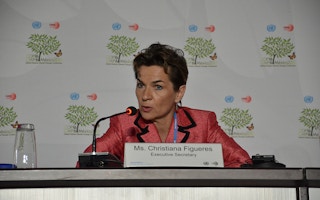The Green Climate Fund must set the stage for successful talks at the next United Nations climate meeting due at the end of the year in Durban, said UN Climate Chief Christiana Figueres on Friday.
The managers behind this fund must also produce a framework that will open up a flood of new financing for climate change initiatives globally, she said.
The Green Climate Fund was one of few concrete developments that came out of last December’s UN climate talks in Cancun, in which on-going disputes between developing and developed countries continued to stall progress on an international treaty to curb carbon emissions.
The fund’s transitional committee, charged with designing a mechanism for efficiently mobilising a targeted USD 100 billion per year for developing countries by 2020 from a mix of public and private sources, held its first meeting last week in Mexico City.
Speaking after the conclusion of the meeting, Ms Figueres said the successful implementation of the Green Climate Fund was crucial to the overall progress of international climate change talks.
“Every year, nations must work together to build better, more ambitious international responses in the common effort against human-generated climate change,” she said. “The launch of the Green Climate Fund is one of the significant decisions that nations reached in Cancun, which show that governments can take repeated steps forward, including this year in Durban,” she added.
Ms Figueres’ demands for the committee went beyond political success however; she fully expects the fund’s implementation to spur a flood of new and additional large-scale funding for climate change initiatives.
She said the fund must become “the window into an era of vastly greater financing for climate action in the developing world.”
“I am convinced that as governments, industry and investors increasingly realise that a low-carbon future in a world resilient to climate change is not only necessary but sustainable and profitable, then the necessary finance will flow faster than many now expect. A well-designed Green Climate Fund will help ensure that this happens sooner rather than later,”
she explained.
The fund is expected to help developing countries transform into low-carbon economies that are prepared to cope with effects of climate change, such as sea level rises, alterations in weather patterns and changing agricultural conditions. A large part of that transformation involves investment in renewable energies and energy efficiency measures.
According to Bloomberg’s New Energy Finance, investments in clean energy totalled $243 billion last year, and would need to reach $500 billion annually to reach climate targets.
Part of the committee’s mandate is to plug this finance gap by leveraging other sources of funds, such as from the private sector. Members stressed at the meeting that to do this, a fund that is is efficient, effective and transparent is key - and they need to do it in time for approval by the next UN Climate Conference in Durban in December.
The 40 member transitional committee will eventually make way for a Green Climate Board consisting of 24 members evenly divided between developed and developing countries. The Board will oversee an independent secretariat and a designated trustee to administer the assets. The World Bank is currently serving as interim trustee, an arrangement that will be reviewed after three years of operation.
Ms Figueres expressed her confidence in the transitional committee members, who include finance and climate change experts from both developed and developing countries. The committee is led by the three co-chairs elected last week, including Mexican Finance Minister Ernesto Cordero Arroyo, South African Minister in the Presidency for Planning Trevor Manuel and Norway’s State Secretary at the Ministry of Finance Kjetil Lund.
“This impressive and essential mix of experience and skills combines the practical knowledge of managing finance with the practical needs of developing nations to create sustainable futures,” said Ms Figueres.








